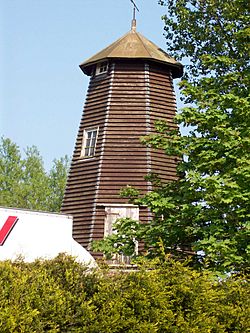Crowfield Windmill facts for kids
Quick facts for kids Crowfield Windmill |
|
|---|---|

Crowfield Mill, April 2007
|
|
| Origin | |
| Mill name | Crowfield Mill |
| Mill location | TM 151 571 |
| Coordinates | 52°10′12″N 1°08′47″E / 52.17000°N 1.14639°E |
| Operator(s) | Private |
| Year built | c1840 |
| Information | |
| Purpose | Corn mill |
| Type | Smock mill |
| Storeys | Three-storey smock |
| Base storeys | One storey |
| Smock sides | Eight sides |
| No. of sails | Four Sails |
| Type of sails | Patent sails |
| Winding | Fantail |
| No. of pairs of millstones | Two pairs |
Crowfield Windmill is a special type of windmill called a smock mill. It is located in Crowfield, Suffolk, England. This historic mill has been carefully preserved.
Contents
History of Crowfield Windmill
From Pumping Water to Grinding Grain
Crowfield Windmill was not always a corn mill. It was first built near Great Yarmouth. Its original job was to work as a drainage mill. This means it used wind power to pump water away from land.
Around the year 1840, the windmill was moved to Crowfield. Here, it got a new purpose. It was changed into a corn mill. A corn mill uses large stones to grind grain into flour.
Working by Wind and Engine
The mill used wind power to grind corn for many years. It worked this way until 1916. In that year, a strong wind blew the top part, called the cap, right off the mill.
After this damage, the mill could no longer use wind. So, an extra engine was added. This engine helped power the millstones. It kept the mill working until the mid-1930s.
What Does Crowfield Windmill Look Like?
Parts of a Smock Mill
Crowfield Windmill is a three-storey smock mill. This means it has three main levels. It sits on a strong base made of brick. This base is one storey high.
The mill once had four large sails. These were called patent sails. They were special because they could adjust to the wind automatically.
How It Faced the Wind
The top part of the mill, the cap, was shaped like a boat. A special device called a fantail helped turn the cap. This made sure the sails always faced the wind.
Inside the mill, there were two pairs of millstones. These stones were used to grind the corn. They were mounted on a strong wooden frame called a hurst frame. The millstones ground the grain from below, which is called underdrift.
Millers at Crowfield Windmill
A miller is a person who operates a mill. One known miller at Crowfield Windmill was Gibbons. He worked at the mill in the 1930s.
 | William L. Dawson |
 | W. E. B. Du Bois |
 | Harry Belafonte |

